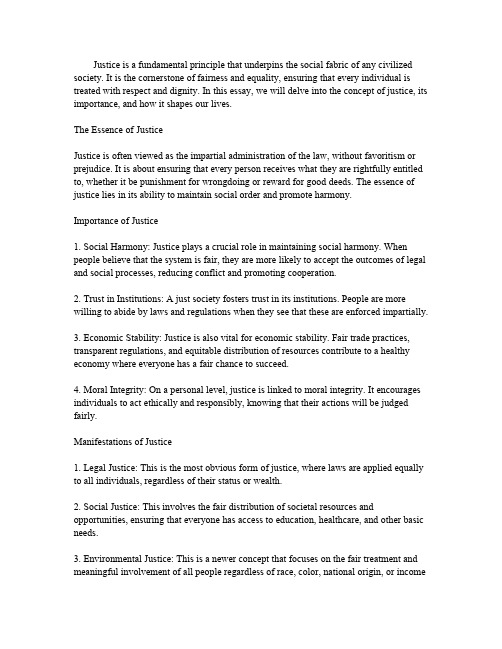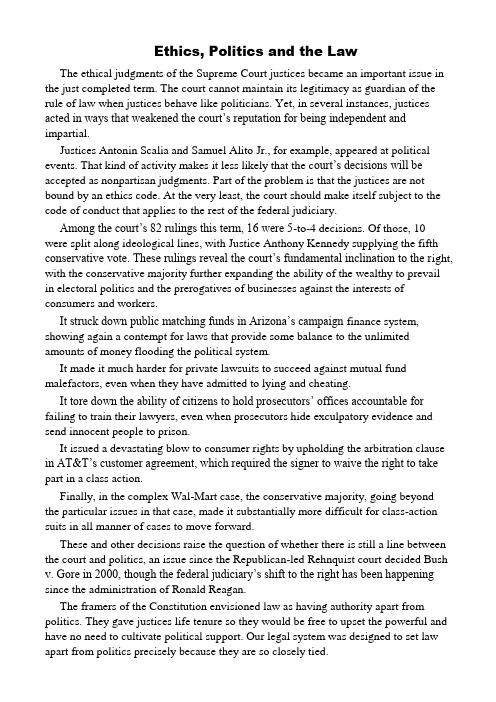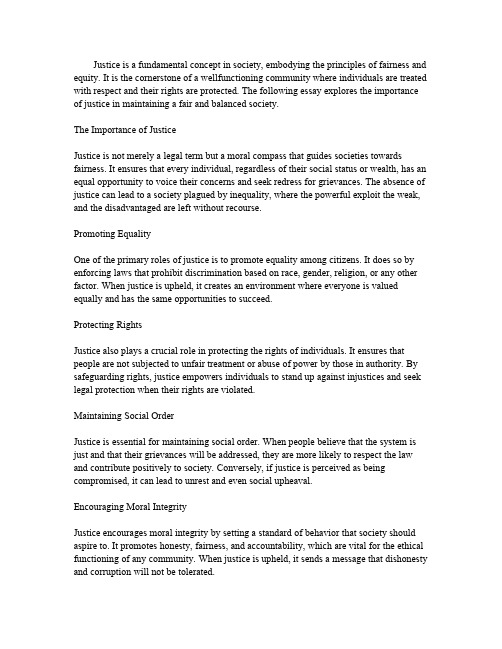Ethics,Justice,andFairTreatmentinHRManagement
公正照人心的英语作文

Justice is a fundamental principle that underpins the social fabric of any civilized society.It is the cornerstone of fairness and equality,ensuring that every individual is treated with respect and dignity.In this essay,we will delve into the concept of justice,its importance,and how it shapes our lives.The Essence of JusticeJustice is often viewed as the impartial administration of the law,without favoritism or prejudice.It is about ensuring that every person receives what they are rightfully entitled to,whether it be punishment for wrongdoing or reward for good deeds.The essence of justice lies in its ability to maintain social order and promote harmony.Importance of Justice1.Social Harmony:Justice plays a crucial role in maintaining social harmony.When people believe that the system is fair,they are more likely to accept the outcomes of legal and social processes,reducing conflict and promoting cooperation.2.Trust in Institutions:A just society fosters trust in its institutions.People are more willing to abide by laws and regulations when they see that these are enforced impartially.3.Economic Stability:Justice is also vital for economic stability.Fair trade practices, transparent regulations,and equitable distribution of resources contribute to a healthy economy where everyone has a fair chance to succeed.4.Moral Integrity:On a personal level,justice is linked to moral integrity.It encourages individuals to act ethically and responsibly,knowing that their actions will be judged fairly.Manifestations of Justice1.Legal Justice:This is the most obvious form of justice,where laws are applied equally to all individuals,regardless of their status or wealth.2.Social Justice:This involves the fair distribution of societal resources and opportunities,ensuring that everyone has access to education,healthcare,and other basic needs.3.Environmental Justice:This is a newer concept that focuses on the fair treatment and meaningful involvement of all people regardless of race,color,national origin,or incomewith respect to the development,implementation,and enforcement of environmental laws, regulations,and policies.4.Restorative Justice:This approach to justice focuses on the rehabilitation of offenders through reconciliation with victims and the community at large.Challenges to JusticeDespite its importance,justice faces numerous challenges:1.Corruption:This undermines the fairness of legal systems,leading to unequal treatment of individuals.2.Discrimination:Prejudice based on race,gender,or other factors can lead to injustice, where certain groups are systematically disadvantaged.ck of Access:In some cases,people may not have the means or knowledge to access justice,particularly in legal matters.4.Power Imbalances:Those with more power or resources can sometimes influence outcomes in their favor,distorting the concept of justice.ConclusionJustice is a complex and multifaceted concept that is essential for the functioning of society.It requires constant vigilance and effort to ensure that it is upheld.By promoting justice,we can create a world where everyone has the opportunity to thrive and contribute to the common good.It is our collective responsibility to work towards a more just society,where the light of justice shines brightly for all.。
hrm10_ppt14Ethics,Justice,andFairTreatmentinHRMana

behavior at work.
3. Describe at least four specific ways in which HR
management can influence ethical behavior at work.
• Behaviors that override self-interest.
© 2005 Prentice Hall Inc. All rights reserved.
14–5
Ethics and Fair Treatment at Work (cont’d)
➢ Ethics and the law
14–2
Ethics and Fair Treatment at Work
➢ Ethics
– The principles of conduct governing an individual or a group; specifically, the standards you use to decide what your conduct should be.
Table 14–1
14–11
What Is Organizational Culture?
➢ Organization culture
– The characteristic values, traditions, and behaviors a company’s employees share.
© 2005 Prentice Hall Inc. All rights reserved.
14–6
Ethics, Fair Treatment, and Justice
Ethics, Politics and the Law 《New York Times》

Ethics, Politics and the LawThe ethical judgments of the Supreme Court justices became an important issue in the just completed term. The court cannot maintain its legitimacy as guardian of the rule of law when justices behave like politicians. Yet, in several instances, justices acted in ways that weakened the court’s reputation for being independent and impartial.Justices Antonin Scalia and Samuel Alito Jr., for example, appeared at political events. That kind of activity makes it less likely that the c ourt’s decisions will be accepted as nonpartisan judgments. Part of the problem is that the justices are not bound by an ethics code. At the very least, the court should make itself subject to the code of conduct that applies to the rest of the federal judiciary.Among the court’s 82 rulings this term, 16 were 5-to-4 decisions. Of those, 10 were split along ideological lines, with Justice Anthony Kennedy supplying the fifth conservative vote. These rulings reveal the court’s fundamental inclination to the r ight, with the conservative majority further expanding the ability of the wealthy to prevailin electoral politics and the prerogatives of businesses against the interests of consumers and workers.It struck down public matching funds in Arizona’s campaign finance system, showing again a contempt for laws that provide some balance to the unlimited amounts of money flooding the political system.It made it much harder for private lawsuits to succeed against mutual fund malefactors, even when they have admitted to lying and cheating.It tore down the ability of citizens to hold prosecutors’ offices accountable for failing to train their lawyers, even when prosecutors hide exculpatory evidence and send innocent people to prison.It issued a devastating blow to consumer rights by upholding the arbitration clause in AT&T’s customer agreement, which required the signer to waive the right to take part in a class action.Finally, in the complex Wal-Mart case, the conservative majority, going beyond the particular issues in that case, made it substantially more difficult for class-action suits in all manner of cases to move forward.These and other decisions raise the question of whether there is still a line between the court and politics, an issue since the Republican-led Rehnquist court decided Bush v. Gore in 2000, though the federal judiciary’s shift to the right has been happening since the administration of Ronald Reagan.The framers of the Constitution envisioned law as having authority apart from politics. They gave justices life tenure so they would be free to upset the powerful and have no need to cultivate political support. Our legal system was designed to set law apart from politics precisely because they are so closely tied.Constitutional law is political because it results from choices rooted in fundamental social concepts like liberty and property. When the court deals with social policy decisions, the law it shapes is inescapably political — which is why decisions split along ideological lines are so easily dismissed as partisan.The justices must address doubts about the court’s legitimacy by making themselves accountable to the code of conduct. That would make their rulings more likely to be seen as separate from politics and, as a result, convincing as law.。
员工在外兼职

Figure 14–1 2
Fair Treatment and Justice
Distributive justice
Fairness and justice of a decision’s result Fairness of the process by which the decision was reached Manner in which managers conduct their interpersonal dealing with employees
15
16
熱爐法則 (Hot-Stove Rule)
4
員 工 權 利 (employee rights)
權利 (Right): 為法律或社會約束力所保障, 不受任何人干擾的行為能力。
一. 法定權利 (Statutory Rights) 二. 契約權利 (Contractual Rights) 三. 其他權利 (Others)
5
法 定 權 利 (Statutory Rights)
自由言論
9
紀律管理的意涵與內容
古人說: 制度像水桶,人像水.如果沒有紀律,就像破了洞的 水桶, 水會漏光, 組織也會衰敗. 紀律管理:保障團體中全體人員的利益,約束個人
行為不侵犯他人權益,或違反組織制度,而制定的 行為規範.
紀律管理的內容:獎勵、懲處、申訴 溝通:有助於獎勵、懲處與申訴的執行
10
員 工 紀 律
13
正面紀律四步驟
員工和上司討論雙方可以解決方案. 當失敗,雙方再度會晤,討論失敗原因,並且建立新的計劃 和解決問題的時間表.
如果沒有改善,第三步驟,就是警告員工恐將備開除,讓員 工評估自己狀況,並提出新的解決方案.
Ethics, Justice, and Fair Treatment in HR Management

Ethics and Fair Treatment at Work
The Meaning of Ethics
The principles of conduct governing an individual or a group; specifically, the standards you use to decide what your conduct should be. Ethical decisions characterized by two factors:
The Wall Street Journal Workplace-Ethics Quiz
Source: Wall Street Journal, October 21, 1999, pp. B1– B4; Ethics Officer Association, Belmont, MA; Ethics Leadership Group, Wilmette, IL; surveys sampled a cross-section of workers at large companies and nationwide.
公平守护正义的英语作文

Justice is a fundamental concept in society,embodying the principle of fairness and the equitable treatment of individuals.In the pursuit of justice,it is crucial to ensure that every person receives what they are rightfully due,without bias or favoritism.The concept of justice is deeply rooted in various cultures and legal systems around the world.It is often associated with the idea of moral rightness,where actions are judged based on their adherence to ethical standards.In the context of law,justice is the process by which disputes are resolved fairly and equitably,with due consideration given to the rights and interests of all parties involved.One of the key aspects of justice is impartiality.This means that decisions should not be influenced by personal feelings,prejudices,or external pressures.Judges,for example, are expected to remain neutral and make rulings based solely on the facts and the law. This helps to ensure that justice is served without any unfair advantages or disadvantages. Another important aspect of justice is transparency.This involves making the processes and decisions of the judicial system accessible to the public.By doing so,it helps to build trust in the system and allows for greater accountability.Transparency also helps to prevent corruption and the abuse of power,as it allows for scrutiny and oversight.In addition to impartiality and transparency,justice also requires the protection of individual rights.This includes the right to a fair trial,the right to legal representation, and the right to be presumed innocent until proven guilty.These rights are essential for ensuring that justice is not only served but is also seen to be served.However,achieving justice is not always straightforward.There are often complex issues and competing interests at play,which can make it difficult to reach a fair and equitable outcome.In such cases,it is important for the judicial system to be flexible and adaptable, taking into account the unique circumstances of each case.Moreover,justice is not limited to the legal sphere.It also encompasses broader social issues,such as economic inequality,discrimination,and access to education and healthcare.Addressing these issues is crucial for creating a more just society,where everyone has the opportunity to thrive and succeed.In conclusion,justice is a multifaceted concept that goes beyond the mere resolution of disputes.It involves the fair and equitable treatment of individuals,the protection of rights,and the pursuit of a more just society.By upholding these principles,we can work towards a world where justice is not just an ideal but a reality for all.。
公正护正义的英语作文

Justice is a fundamental concept in society,representing the moral and legal principles that ensure fairness and equality for all individuals.It is the cornerstone of a wellfunctioning community,where people can trust in the system and feel secure in their rights.In an essay on justice,one might begin by defining the term and its importance.Justice can be viewed from various perspectives,such as distributive justice,which deals with the fair distribution of resources,or procedural justice,which focuses on the fairness of processes and decisionmaking.The essay could then delve into the historical evolution of justice,tracing its roots in ancient civilizations like Greece and Rome,where philosophers like Plato and Aristotle first pondered the nature of a just society.It is essential to acknowledge the development of legal systems and the role of justice in shaping laws and regulations that govern modern societies.Discussing the role of justice in contemporary society is crucial.This could include examining how justice is upheld in the legal system,the importance of a fair judiciary, and the challenges faced in ensuring equal access to justice for all members of society, regardless of their social or economic status.The essay might also explore the concept of social justice,which extends beyond the legal realm to encompass issues of equity,human rights,and the fair treatment of marginalized groups.Social justice advocates for the recognition and redress of systemic inequalities and the promotion of inclusive policies that benefit everyone.Furthermore,the essay could address the moral dimensions of justice,examining ethical theories such as utilitarianism,deontology,and virtue ethics,and how they inform our understanding of what is just.Moral dilemmas and the complexities of making just decisions in various situations could be analyzed to demonstrate the intricacies involved in upholding justice.Case studies or reallife examples can be used to illustrate the practical application of justice principles.This might include discussing landmark legal cases,social movements advocating for justice,or instances where justice has been compromised,highlighting the need for continuous vigilance and improvement in our pursuit of a just society. Finally,the essay should conclude by reflecting on the significance of justice in fostering a harmonious and progressive society.It could emphasize the collective responsibility of individuals,institutions,and governments to uphold justice and the importance ofeducation and awareness in promoting a culture of fairness and equality.In writing about justice,it is vital to approach the topic with a comprehensive understanding of its multifaceted nature,recognizing that justice is not only a legal concept but also a moral and social imperative that shapes the very fabric of our communities.。
正义守护公平的英语作文

Justice is a fundamental concept in society,embodying the principles of fairness and equity.It is the cornerstone of a wellfunctioning community where individuals are treated with respect and their rights are protected.The following essay explores the importance of justice in maintaining a fair and balanced society.The Importance of JusticeJustice is not merely a legal term but a moral compass that guides societies towards fairness.It ensures that every individual,regardless of their social status or wealth,has an equal opportunity to voice their concerns and seek redress for grievances.The absence of justice can lead to a society plagued by inequality,where the powerful exploit the weak, and the disadvantaged are left without recourse.Promoting EqualityOne of the primary roles of justice is to promote equality among citizens.It does so by enforcing laws that prohibit discrimination based on race,gender,religion,or any other factor.When justice is upheld,it creates an environment where everyone is valued equally and has the same opportunities to succeed.Protecting RightsJustice also plays a crucial role in protecting the rights of individuals.It ensures that people are not subjected to unfair treatment or abuse of power by those in authority.By safeguarding rights,justice empowers individuals to stand up against injustices and seek legal protection when their rights are violated.Maintaining Social OrderJustice is essential for maintaining social order.When people believe that the system is just and that their grievances will be addressed,they are more likely to respect the law and contribute positively to society.Conversely,if justice is perceived as being compromised,it can lead to unrest and even social upheaval.Encouraging Moral IntegrityJustice encourages moral integrity by setting a standard of behavior that society should aspire to.It promotes honesty,fairness,and accountability,which are vital for the ethical functioning of any community.When justice is upheld,it sends a message that dishonesty and corruption will not be tolerated.Challenges to JusticeDespite its importance,justice faces numerous challenges.Corruption,bias,and the influence of wealth and power can undermine the fairness of the judicial system.To overcome these challenges,societies must continually strive to improve their legal frameworks,ensure transparency in judicial processes,and educate citizens about their rights and responsibilities.ConclusionIn conclusion,justice is the bedrock of a fair society.It is the force that levels the playing field,protects the vulnerable,and upholds the values of equality and integrity.By recognizing and addressing the challenges to justice,societies can work towards a future where fairness is not just an ideal but a reality for all.。
